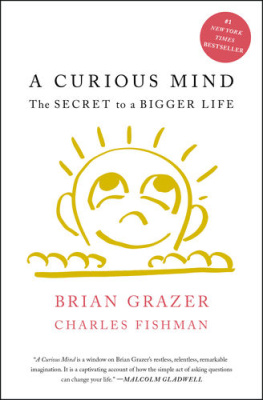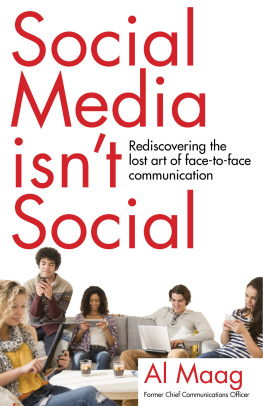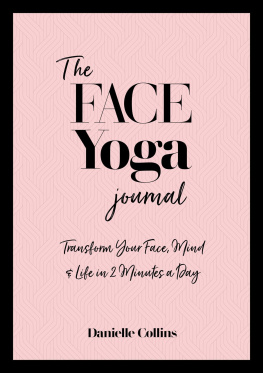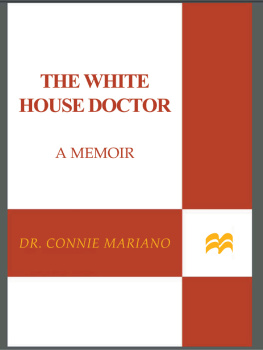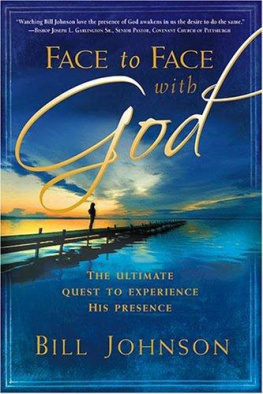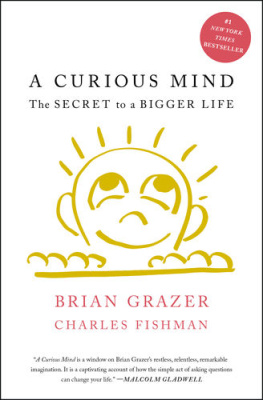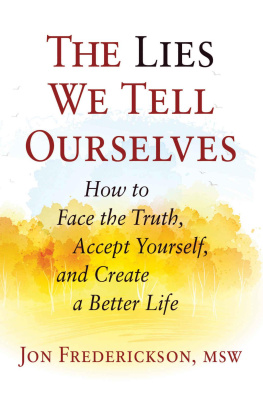PRAISE FOR
Face to Face

In our increasingly digital world, Brian Grazer takes us on his personal journey of human connection. He proves that the simple step of making eye contact transformed his life and can change yours too. This is a must-read for our time.
Neil Blumenthal, co-founder and co-CEO of Warby Parker
In this digital age, connecting is what humanity is all about. Brian Grazers captivating and very personal stories are a call to action for us all to see one another. Face to Face s message is essential for our time.
Anne Wojcicki, co-founder and CEO of 23andMe
I remember countless times when Brian made the impossible possible through a single face-to-face conversation. In his new book, he has done a deep dive into the subject of influential face-to-face communication and why it gets things done in business and in life.
Ron Howard, Academy Awardwinning director
At a time when human connection is increasingly interrupted by our growing addiction to screens, this captivating book reveals how we can all transform our lives by truly connecting with others. Using highly personal stories, Brian Grazer shows how the simple act of looking up can change your life.
Arianna Huffington, founder of Huffington Post , and CEO of Thrive Global
Brians gift is being able to get to the essence of what, and more important, why a person feels the way they do. His stories and insights will open your heart and mind to the urgency of human connection.
Jimmy Iovine, entrepreneur
I dont know anyone as interestingor interestedas Brian Grazer. Face to Face is a how-to guide to connecting to other people. Nobody else I know could have written it.
Angela Duckworth, author of Grit
Being connected is not the same thing as connecting. Only when we meet people, face to face, can we form the kinds of meaningful connections that truly matter in our lives. And Brian Grazer is the master. Told through the stories of his own journey, Face to Face is a great reminder and a valuable guide for how we too can connect with people in deeper, more meaningful ways.
Simon Sinek, optimist and author of Start With Why and Leaders Eat Last
ALSO BY BRIAN GRAZER
A Curious Mind: The Secret to a Bigger Life

Simon & Schuster
1230 Avenue of the Americas
New York, NY 10020
www.SimonandSchuster.com
Copyright 2019 by Brian Grazer
Certain names and identifying details have been changed.
All rights reserved, including the right to reproduce this book or portions thereof in any form whatsoever. For information, address Simon & Schuster Subsidiary Rights Department, 1230 Avenue of the Americas, New York, NY 10020.
FirstThis Simon & Schuster hardcover edition SeptemberNovember 2019
SIMON & SCHUSTER and colophon are registered trademarks of Simon & Schuster, Inc.
For information about special discounts for bulk purchases, please contact Simon & Schuster Special Sales at 1-866-506-1949 or .
The Simon & Schuster Speakers Bureau can bring authors to your live event. For more information or to book an event, contact the Simon & Schuster Speakers Bureau at 1-866-248-3049 or visit our website at www.simonspeakers.com.
Interior design by Paul Dippolito
Jacket design by Jason Heuer
Jacket art by Marish/Shutterstock
Endpaper painting by Mark Bradford
Library of Congress Cataloging-in-Publication Data is available.
ISBN 978-1-5011-4772-2
ISBN 978-1-5011-4774-6 (ebook)
For my wife, Veronica, my soul mate in every way. You see all of me.
Contents
Introduction
Brian, look at me when Im speaking to you!
Its been a while since I was in elementary school, but I can still remember when my teacher, Miss Jenkins, would call on me. My entire body would break out in a cold sweat. My heart would pound. And my eyes would look anywhere except in Miss Jenkinss direction.
Miss Jenkins probably didnt look threatening to anyone else. But she absolutely terrified me. Once, when she thought I wasnt paying attention in class, she took me outside the room and hit me across the face with a wooden paddle, leaving a throbbing, red welt across my cheek. More than Miss Jenkinss temper, though, what truly petrified me was her ability to make me feel humiliated just by asking me a question. I almost never knew the answer, and being forced to admit thattime after time, out loud, in front of the whole classwas mortifying. The other students snickered behind my back and whispered jokes at my expense. It hurt worse than a paddle to the face. I dreaded going to school every morning because I anticipated another question from Miss Jenkins, and more humiliation.
Needless to say, short of hiding under my desk (tempting though it was), I did everything I could to stay off Miss Jenkinss radar. When she asked a question, scanning the room for a response, I would turn my head or fake a cough. I came up with all kinds of excuses: bathroom breaks, stomachaches, even a feigned broken toe. But my avoidance technique of choice was the Look-Away. At this age, hiding my eyes was the ultimate way to disconnect. I figured, if I didnt meet Miss Jenkinss eyes, she wouldnt call on me. Disaster averted. When I saw other students using the same move, I understood that they were probably averting their eyes to avoid embarrassment too.
Of course, my attempts to evade my teachers attention werent always successful. On those days when she called my name, rather than glance in her direction to signal Id heard, Id continue to stare at the ceiling... or the chalkboard... or my feet. If I didnt look at her, I thought, maybe she would look away too. Maybe she would take pity on me and move on to someone else. Maybe I would disappear entirely and she wouldnt see me anymore. It was a far-flung hope. But it was worth a shot if it meant that I could avoid looking clueless, yet again, in front of my friends and classmates.
The truth is, school was hard for me. The reason I had trouble answering questions in class was that I had trouble doing my homework; and the reason I had trouble doing my homework was because reading was incredibly difficult for me. Id look at the words, but they made no sense. I couldnt sound them out. I couldnt connect the symbols on the page with the language I knew and used every day. In retrospect, I understand that I was dealing with a reading disability. Unfortunately, this was way back before it might have been more readily identified as dyslexia. At the time, people just assumed that if your reading skills were weak it was because you were lazy or stupid.
I dont think my situation at home made things any easier. More often than not, Id barely survive a day at school just to come home to find my parents arguing. They were constantly bickeringat times full-out yelling at each otherand a lot of their fights seemed to be about what to do with me and whether to hold me back a grade. But they rarely talked to me about it. Long story short, as a kid, I felt alone and anxious, pretty much all the time.
It was really thanks to my beloved grandma, Sonia, that I was able to gain some confidence and change my relationship with academics as I entered high school. A classic, four-foot-ten Jewish grandmother, she always believed in me and tried to reinforce my areas of strength, one of which was verbal communication. See, Ive always been a better talker than reader. Grandma Sonia would grab my hand and tell me, Brian, youve got the gift of gab. Youre going all the way! and Never stop asking those questions of yours! The more I embraced these messages internally, the more assured I became at school. I started to ask questions and contribute to discussions voluntarily. Rather than avoid my teachers, I engaged and connected with them. It wasnt long before I realized that when I looked at my teachers and classmates while they were speaking, I was better able to absorb what they were saying. The more focused I was, the more intently I listened, the easier it was to understand the material. It turns out that all that time I had been trying to disengage in elementary school, hiding my eyes so that the teacher wouldnt call on me, I was making learning even harder for myself.

